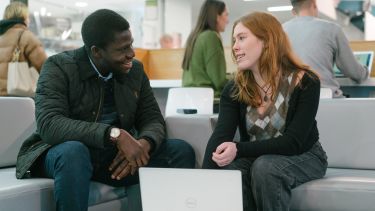There are 300 societies that you can join at ∫˘¬´”∞“µ, from sport to baking to games.

I would recommend making a list of hobbies and interests that you are into now or have done in the past and see if there is a society that matches that interest. If there is not a society you are interested in, the students union gives you an option to create your own society. Societies are a great way to make friends and offer amazing opportunities.
Finding a society
Josephine Gibson
Choosing ∫˘¬´”∞“µ
I chose to carry out my degree at ∫˘¬´”∞“µ because I liked the city. ∫˘¬´”∞“µ is a very green city, it has wonderful parks, loads of independent shops and cafes and the peak district is on the doorstep. I liked the community aspect that the halls provided in the first year accommodation. I also liked the friendly and inclusive feel of the student union and all of the different societies that you could get involved in. As well as the study spaces and libraries across the campus.
What was it about ∫˘¬´”∞“µ University Management School?
The Management School is a triple accredited school, and offers support for placements and applying in the employability hub. I like the modern building and study spaces along with a café serving tasty food. I also like the fact that in your third year you get to choose what modules you want to study.
Being on the Management Society committee
The Management Society is an academic society. The society offers a range of socials from bar crawls to coffee mornings, giving members a chance to meet course mates outside of lectures. We host events such as formal balls and a trip abroad/in the UK, this year we are going to Prague. We offer career talks with alumni graduates and placement students from ∫˘¬´”∞“µ University. These talks provide insight into applying for placements/graduate roles and give people a chance to ask questions.
We have our own football and netball sports teams that are less intense than the Universities official teams. We also have an annual volunteering project that members have a chance to get involved in, to boost their employability skills and give back to the local community.
I would recommend students to get involved in the Management Society, as it is relatively cheap to join and there are plenty of opportunities to make friends and have fun away from studies. The society also offers exciting events and a chance to develop your skill set through the career talks and projects we run. Everyone who attends this University has the chance to be on a committee for a society. This is a great way to boost skills, make friends and be part of a team that organises things for members.
My role in second year on the Management Society was the Charity and Inclusion Officer and now my role is President. I am in charge of overseeing all that happens in the society, planning meetings, admin for society deadlines, delegating tasks, marketing the society and making decisions as well as looking after the overall wellbeing of the committee and members.
There are 300 societies that you can join at ∫˘¬´”∞“µ, from sport to baking to games. I would recommend making a list of hobbies and interests that you are into now or have done in the past and see if there is a society that matches that interest. If there is not a society you are interested in, the students union gives you an option to create your own society. Societies are a great way to make friends and offer amazing opportunities. I am a member of the Swimming Society and Bummit Society which is a charity society, where I hitchhiked to Cardiff from ∫˘¬´”∞“µ raising ¬£80 for local charities. Last year I joined the Ski society and went on their Ski trip.
Working for the university
The University offers lots of jobs, from working in the Student Union, to mentors to ambassadors. All University jobs work around your academic timetable and are flexible. In my second year, I was an ambassador for the University and a mentor for the Widening Participation Team. In my third year, I am an academic ambassador as well as a University ambassador. The University sends emails out to your inbox every year when they are hiring so I would look out for them, equally you can ask at the Students Union about applying for university jobs or your individual department. By having a job at University I not only get money to help fund activities, but I have also gained valuable skills. As a mentor I developed my communication, relationship building and listening skills, I also helped to provide guidance and motivation to younger students. As an ambassador I developed my ability to present, as I lead campus tours for the public, I developed my ability to use my initiative and problem solve on open days. As an academic ambassador I developed my written communication as well as my verbal communication. All of these jobs helped me grow my confidence and help with my organisation and time management skills, as I am working alongside my studies. The skills I have developed and learned will help me in a future career as I feel confident to handle most situations and be able to see things from different perspectives.
Managing your time
To manage my time I make sure I know what to prioritise and I keep a diary and weekly planner. The University is really good at understanding that students have other commitments and deadlines to complete as well as their job. Therefore, all work for the University apart from certain jobs on the Widening Participation Program is casual, and you don’t have to take up the offer for work if you have other commitments. I make sure to write out all of my deadlines so I know not to take a job close to a deadline if it means I won't have time to revise. For my roles on the Committee I have realised I can’t commit to holding a Committee meeting every week so I hold one every fortnight, I also change whether that meeting is online or in person depending on commitments. As President, I make sure to be aware of exam timetables and deadlines that people may have in the week in order not to plan socials or events within that week. I also set out two hours in my week to go through emails to make sure I am up to date with the latest information.
What advice would you give to someone who wants to build their employability skills whilst at university but doesn’t fancy a year long placement?
Placements can be difficult and time consuming to apply for, you also may have to relocate to the area the placement is in, which can be a challenging process. They are a great opportunity and experience if you persevere to get one. However, there are plenty of ways to boost your employability at University. My advice is don’t take on too much and recognise when you may be stressed or overwhelmed because you are doing too much. Recognise when you may need to drop an extra curricular so you can focus on your degree. There are lots of societies to get involved in with lots of different roles on committees. Students have ample opportunity to gain employability skills and have projects to be responsible for. Equally, the University has a volunteering team where you can get involved in student volunteering opportunities, or you can set up a volunteering project and become a student project leader. This will improve your leadership skills and you have the chance to give back to charity. Equally, any job/committee role/project that you have in University will help you gain a wide range of skills, and show employers that you are proactive and can multitask between your degree and extra curricular.
Course highlight
The highlight of my course so far has been the fact that I have learnt lots of different elements of business. In my first year I had a module on economics, accounting and finance and statistics, which provided an opportunity to learn subjects that are relevant to business but are not specific to my degree. This now means I have a broader understanding of how businesses run. In my second year I had a module on business intelligence which I really enjoyed as I got to learn about how technology can aid a business's operations. I like the fact that in third year you get to choose all your modules as you can really explore your interests.
What skills have you developed so far during your degree?
∫˘¬´”∞“µ business course offers a wide range of modules that cover all aspects of business. For example, you can take modules on operations, leadership, entrepreneurship, HR and Strategy. I believe that when going into the world of work I have ample knowledge on all aspects of business. I believe that by doing this degree I have also developed the skill to analyse different perspectives and not just take one view on things. Equally I have developed my skill to manage my own time and learning as well as academic skills such as referencing.

International undergraduate scholarships
We offer a generous package of financial support for international undergraduate students, including scholarships worth £10,000 towards the annual tuition fee (worth up to £40,000 for four-year programmes).
Applications are open for existing offer holders for an undergraduate degree programme starting in autumn 2025.

